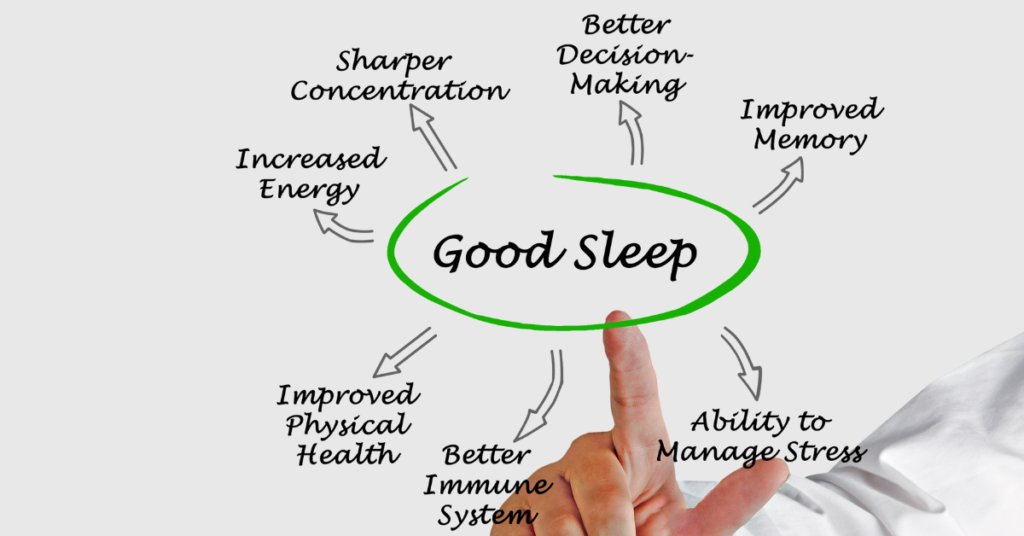In our fast-paced world, sleep often gets relegated to the bottom of our priority list. Many of us believe that sacrificing a few hours of sleep in favor of work, socializing, or entertainment won’t have significant consequences. However, the relationship between sleep and our mental health is profound and complex, especially when it comes to depression. Understanding this connection is crucial for both prevention and treatment of mental health issues. Understanding this connection is crucial for both prevention and treatment of mental health issues. At the Depression Clinic in Mesa, we emphasize the importance of proper sleep hygiene as a key component of our comprehensive approach to mental health care. By addressing sleep disturbances, we can significantly improve outcomes for individuals struggling with depression and other mental health disorders.
The Science of Sleep and Mental Health
Sleep is not merely a time of rest; it’s a vital process for maintaining physical and mental health. During sleep, our bodies and brains undergo essential restorative processes. The brain consolidates memories, processes emotions, and performs critical housekeeping tasks that support cognitive function. Disruptions in sleep can, therefore, have far-reaching effects on our mental well-being. If sleep problems persist, it might be time to consult a healthcare provider, such as Primary Care Mesa or a Primary Care doctor’s Mesa. Cognitive-behavioral therapy for insomnia (CBT-I) is an effective treatment for chronic sleep issues and can also alleviate symptoms of depression. In some cases, medication may be necessary to manage both sleep disturbances and depressive symptoms.
The Bi-Directional Relationship
Research has consistently shown a bi-directional relationship between sleep and depression. This means that poor sleep can contribute to the onset of depression, and depression can lead to sleep disturbances. Let’s delve into how this works.
Sleep Deprivation and Depression
Chronic sleep deprivation can lead to changes in brain function and chemistry, increasing the risk of developing depression. When we don’t get enough sleep, our brains struggle to regulate mood and stress responses. Neurotransmitters like serotonin and dopamine, which are critical for mood regulation, can be adversely affected by lack of sleep. Over time, this imbalance can lead to symptoms of depression.
Depression and Sleep Disturbances
Conversely, individuals suffering from depression often experience sleep problems. Insomnia, hypersomnia (excessive sleeping), and disrupted sleep patterns are common symptoms of depression. The altered sleep architecture in depressed individuals—where deep sleep stages are reduced and REM sleep is fragmented—can exacerbate the condition. This creates a vicious cycle where poor sleep worsens depression, and worsening depression further disrupts sleep.

Common Sleep Disorders Linked to Depression
Several sleep disorders are closely linked to depression, each affecting individuals differently.
Insomnia
Insomnia, characterized by difficulty falling asleep, staying asleep, or waking up too early, is prevalent among those with depression. Persistent insomnia increases the risk of developing depression, and for those already diagnosed, it can worsen the severity of depressive episodes.
Sleep Apnea
Obstructive sleep apnea (OSA) is a condition where breathing repeatedly stops and starts during sleep. This leads to fragmented sleep and reduced oxygen supply to the brain. OSA is associated with a higher risk of depression, partly due to the chronic fatigue and sleep disruption it causes.
Restless Legs Syndrome (RLS)
RLS is a neurological disorder characterized by an uncontrollable urge to move the legs, often accompanied by uncomfortable sensations. These symptoms typically worsen at night, leading to significant sleep disruption. People with RLS are at a higher risk of developing depression due to the chronic sleep deprivation they experience.
Strategies for Improving Sleep and Reducing Depression Risk
Improving sleep hygiene can have a positive impact on mental health and help mitigate the risk of depression. Here are some strategies to consider:
Establish a Regular Sleep Schedule
Going to bed and waking up at the same time every day helps regulate your body’s internal clock. Consistency reinforces your sleep-wake cycle, making it easier to fall asleep and wake up naturally.
Create a Sleep-Conducive Environment
Your bedroom should be a sanctuary for sleep. Keep it cool, dark, and quiet. Invest in a comfortable mattress and pillows, and consider using blackout curtains and white noise machines if needed.
Limit Exposure to Screens Before Bed
The blue light emitted by phones, tablets, and computers can interfere with your body’s production of melatonin, a hormone that regulates sleep. Try to avoid screens at least an hour before bedtime.
Practice Relaxation Techniques
Techniques such as deep breathing, meditation, and progressive muscle relaxation can help calm your mind and prepare your body for sleep. Regular practice of these techniques can improve overall sleep quality.
Seek Professional Help
If sleep problems persist, it might be time to consult a healthcare provider, such as Primary Care Mesa and Voyage Medical Primary Care. Cognitive-behavioral therapy for insomnia (CBT-I) is an effective treatment for chronic sleep issues and can also alleviate symptoms of depression. In some cases, medication may be necessary to manage both sleep disturbances and depressive symptoms.
The link between sleep and depression is intricate and underscores the importance of prioritizing sleep as part of overall mental health care. By understanding this relationship and adopting healthier sleep practices, we can take significant steps towards preventing and managing depression. Remember, good sleep is not a luxury; it’s a necessity for a healthy, balanced life.
If you are suffering symptoms of sleep disturbances or depression, don’t be afraid to get in touch with your primary care physician or search for a Doctor’s Office Near Me, Primary Care Near Me, or primary physicians near me. Our primary care physicians at Voyage Medical are capable of providing you with the treatment you require.
To schedule an appointment with one of our primary care physicians, please contact our Voyage Medical Primary Care office today at (480)-306-5000 or you may visit us at 1130 W. Grove Ave. Suite 115, Mesa, AZ. 85210 .
The information provided in The Voyage Medical Blogs is for general informational purposes only and is not intended as medical advice. It should not replace consultation with qualified healthcare professionals. Please consult a healthcare professional for medical advice tailored to your specific situation.
If you are looking for Primary Care doctor then you’ve come to the right place. Arizona Doctors Office, Mesa Doctors Office, Primary Care Phoenix, Primary Care Mesa, Primary Care Tempe, Primary Care Chandler, Doctors Office Mesa, Doctors Office Arizona, Doctors Office Tempe, Doctors Office Phoenix, Doctors Office Chandler.
Where To Get Travel Vaccines? Travel Vaccine Mesa, Travel Vaccine Phoenix, Travel Vaccine Chandler, Travel Vaccine Tempe, Travel Vaccine Near me, Travel Vaccine Scottsdale, Travel Vaccine Arizona.
If you are looking for Vaccines then you’ve come to the right place. If you are looking for any one of the following then rest assured we have you covered: Tempe Arizona Vaccine Clinic, Phoenix Vaccination Clinic, Yellow Fever Clinic Near Me, Yellow Fever Vaccine Phoenix, Yellow Fever Vaccine Mesa, Yellow Fever Vaccine Scottsdale, Yellow Fever Vaccine Tempe, Vaccination Clinic Near Me, Mesa Vaccine Clinic, Japanese Encephalitis Vaccine, Vaccine Clinic Scottsdale, Vaccine Clinic Open Now, Vaccine Clinic Mesa, Vaccine Clinic Glendale, Vaccines for Travel, Hepatitis A Vaccine, Hepatitis B Vaccine, Hepatitis B Vaccine Tempe, Hepatitis Vaccine Yellow Fever Vaccine Tempe, Rabies Vaccine Scottsdale, Polio Vaccine Mesa, Polio Vaccine Phoenix, Polio Vaccine Scottsdale, Polio Vaccine Arizona, Polio Vaccine Tempe.

